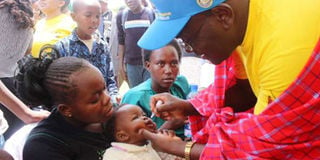Kenya on alert for polio after Nigeria scare

Health Cabinet Secretary Cleopa Mailu administers polio vaccination to a child in Kajiado County during the launch of the nationwide campaign in April 2016. Kenya has heightened surveillance for polio following an outbreak in Nigeria early this month. PHOTO | NATION MEDIA GROUP
What you need to know:
- Ministry of Health experts have asked the government to boost immunisation across the country with special focus on areas with low coverage.
- The new cases in Nigeria are a stark reminder that immunisation of children cannot stop, especially at a time when vaccine-derived polio virus is being detected in the environment.
- In December, experts from the Kenya Medical Research Institute and Centre for Disease Control reported traces of a vaccine-derived polio virus in environmental samples collected in Eastleigh and Mathare sub-counties.
Kenya has heightened surveillance for polio following an outbreak in Nigeria early this month.
Amid rising concerns over the risk of a potential re-introduction of polio in the continent, Ministry of Health experts have assured the public that there is nothing to worry about.
At the same time, they have asked parents in areas with low coverage to take children for vaccination to boost immunisation across the country.
The reasons for heightened surveillance are discovery of the disease in Nigeria’s Borno state after two children were paralysed and the detection of the polio virus from vaccines in Nairobi’s Eastleigh and Mathare areas.
According to an expert at the ministry, the new cases in Nigeria are a stark reminder that immunisation of children cannot stop, especially at a time when vaccine-derived polio virus is being detected in the environment.
“The re-infection in Nigeria means that no country in the world, especially Africa is safe because in the past we have had cases of disease importation,” said the expert who could not be named as they are not allowed to speak to the Press.
In December, experts from the Kenya Medical Research Institute (Kemri) and Centre for Disease Control (CDC) reported traces of a vaccine-derived polio virus in environmental samples collected in Eastleigh and Mathare sub-counties.
Dr Peter Borus, who heads the Kemri polio laboratory, said that compared to samples collected in Kibera, the polio virus samples from the two sub-counties had “mutated and reversed to virulence,” meaning that without good population immunity, it (the virus) has the potential of causing an outbreak.
MINISTRY MITIGATED SITUATION
According to Dr Borus, no cases have been detected because the ministry mitigated the situation by conducting a vaccination campaign to boost immunity.
A vaccine-derived polio virus is a rare type of poliovirus that has genetically mutated from the live weakened strain contained in the oral polio vaccine.
Explaining how the poliovirus is detected in the sewer samples, Dr Borus said: “a day or two after children are given the polio drops, the weakened virus in the vaccine is shed in stool.”
In areas of inadequate sanitation, the excreted vaccine-virus can spread in the immediate community (to offer protection to other children through ‘passive’ immunisation), before eventually dying out.
Last month over 1,000 polio viruses that were used for research at Kemri were destroyed to avoid “accidental or deliberate” release to the public.
But on rare occasions, Dr Borus added, if a population is seriously under-immunised, an excreted vaccine-virus can continue to circulate for an extended period of time and the longer it is allowed to survive, the more genetic changes it undergoes and poses a risk to the community.
“In Eastleigh for example, there is a large number of migrants from Somalia who are undocumented and fear to take their children for vaccination. This small pocket makes the whole community vulnerable and therefore campaign vaccination must be done,” he said.
Last month the government destroyed more than 1000 polioviruses that were used for research at Kemri to avoid “accidental or deliberate” release to the public.





